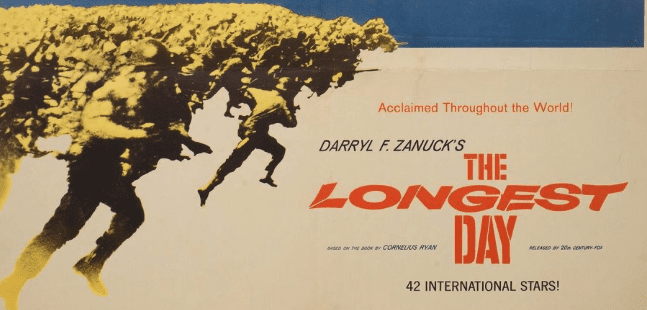written by Todd DePastino

I continue to be enthralled by Bill Bonnamy’s immense effort to trace the footsteps of his father, William M. Bonnamy, who served in the 319th Glider Field Artillery of the 82nd Airborne Division.
The unit was created to join the battle on—get this—wooden glider planes. The 319th was the first Airborne artillery unit to engage the enemy, and it made two glider assaults behind enemy lines during the Second World War.
But it also contains smaller stories, like the remembrance of when Bill was 11 years old in 1962, and went to see “The Longest Day” with his father.
“The Longest Day” was a big production that fall. The movie was billed as the most accurate account of the D-Day Normandy Invasion of June 6th, 1944. It starred John Wayne, Henry Fonda, Robert Mitchum, Eddie Albert, and Red Buttons, among others. On September 29, 1962, he drove with his father to the Woods Theater in Chicago.

William Bonnamy, Sr. (Courtesy 319gliderman.com)
The drive to the theater was somber, and his father was unusually quiet. Bill remembers the grandeur of the theatre and the reverent silence during the movie. He settled next to his dad in crushed red velour seats and sat for three hours, barely moving. He recalls the film’s depiction of the use of metal clickers called “crickets” for identification during the D-Day invasion. Those crickets stuck out in his boyhood mind as a cool feature of allied communications.
Bill recalls being consumed with curiosity about his father’s wartime experiences, though his father rarely spoke about it and could get agitated when pressed to hard to share memories.
On the ride home, Bill mentioned the metal crickets to his father.
It was a mistake. William, Sr. reacted defensively: “Why are you asking about that for, it didn’t happen, I don’t remember anything like that.”
In that moment, Bill understood something deep about his father’s wartime experience. He gained emotional knowledge, you might say, and an insight into the distance between Hollywood’s version of war and the real thing.
The drive home was quiet, and his father remained introspective.
“The Longest War” was a gateway into a young boy’s lifelong quest to understand his father’s experiences better, even if his father was never really ready to talk about the war.


